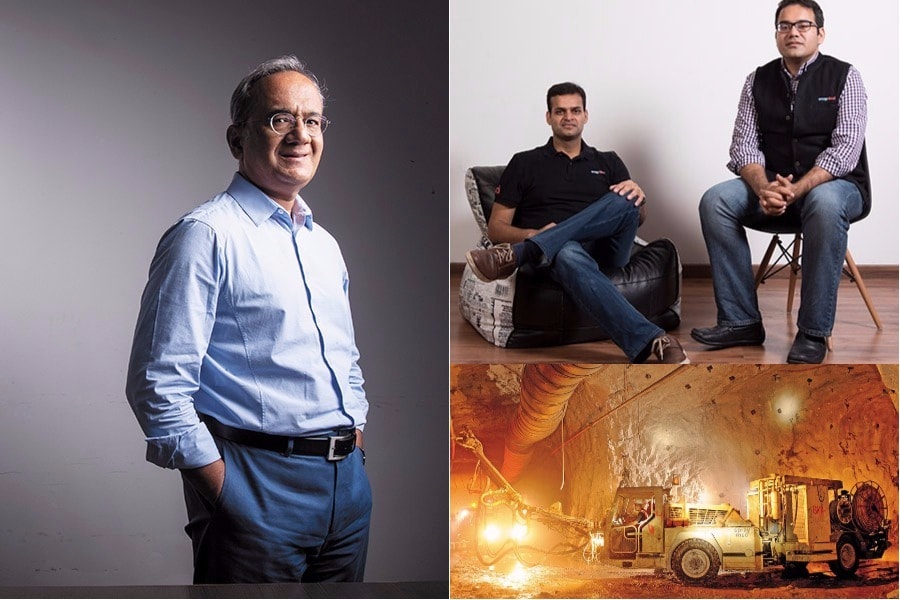7 interesting Forbes India reads you should not miss
The weekend is here and you've been bookmarking stories to read later. We put seven of the most interesting stories our writers put together for you, all in one place.


 Images: (Clockwise from left): Joshua Navalkar Amit Verma
Images: (Clockwise from left): Joshua Navalkar Amit Verma
It's that time of the week when you finally have the time to go through your bookmarks and settle down to read. We put together the most interesting stories our writers wrote this week, to make it easier for you. So sit back and relax. We got you.
1) Beneath the Surface: How Hindustan Zinc grew to become the world's second largest
zinc producer
Varsha Meghani, our senior correspondent, dons a miners' helmet, rubber boots and fluorescent overalls and hops onto a rugged SUV which will take her into the depths of a 500-metre deep mine. The mine is Sindesar Khurd, an underground zinc-lead mine, belonging to Hindustan Zinc in Dariba, Rajasthan. There, she explores and discovers the story of how Hindustan Zinc changed its fortunes from being a loss-making government-run entity to a profit-making entity under Vedanta. The story explores Anil Agarwal's vision and tactics that changed the fortunes of the company-now the most profitable under the group. Click here to read
2) Three Indian companies in Forbes Asia's 2017 'Best under a Billion' list
Forbes Asia just released its 2017 'Best under a Billion' list that honours 200 companies with annual revenue between $ 5million and $1 billion. Our Online Editor Neeraj Gangal takes you through the three Indian companies that made it to the list this year. The number is down more than 50% from the seven Indian companies that had made it to the list last year. Click here to read
3) Why is the Snapdeal-Flipkart deal taking time? Are Kunal Bahl, Rohit Bansal against it?
The deal between Snapdeal and Flipkart has been in the fray for quite some time now. It's seen the exit
of a Kalaari Capital board member, a rejected proposal, a new 'higher' proposal, and an additional buyer in the fray - Infibeam. In the midst of all of this, Snapdeal sold FreeCharge to Axis Bank for Rs 385 crore. So why's the deal between the two ecommerce firms taking so much time? Our Assistant Editor Paramita Chatterjee and Special Correspondent Sayan Chakraborty try to unscramble the piece of the puzzle, indicating a plausible Plan B that founders Kunal Bahl and Rohit Bansal may have, before yielding power to rival Flipkart. Was the FreeCharge deal done to pave the way for this Plan B? Click here to find out
4) For this environmental solutions company, Mumbai's trash is a treasure
You must have heard the adage 'One man's trash is another man's treasure'. Our intern Katherine Sullivan brought it to life for our readers when she spoke to the trio founders of Sampurn(e)arth, an
environmental solutions company that's treating Mumbai's trash. The company has employed over 100 waste pickers, bringing them into the formal economy, and operates on a triple bottomline model, generating revenue from three different streams. It also sells the recycled products. With Mumbai producing 9,400 tonnes of trash every day, the company has a lot on its hands and is up for the challenge. Click here to read
5) Cyber threat: Enemy at the gates
With cyber attack threats becoming a part of our life, our Associate Editor Aveek Datta along with the
help of other Forbes India writers, provides a 360-degree view of cybersecurity, India's preparedness, and the government's role. The story is set in the aftermath of the widely-reported WannaCry RansomWare and Petya RansomWare attacks. Aveek spoke to some of the victims of cyber attacks - certain banks in India and food-ordering app Zomato, chief information officers and chief technology officers, and the biggies like IBM and Microsoft that are bringing about a change in how companies operate and protect their digital data. Click here to read
6) Symphony: Beating the heat with its air coolers
After resigning to bankruptcy and emerging stronger, Symphony, the leading brand in homegrown air
coolers, is a turnaround story you don't want to miss. Our Senior Assistant Editor Samar Srivastava,
catches up with Symphony's founder, chairman and managing director, Achal Bekari, to talk about the company's single-product strategy, its lessons, and its plans of going global after two overseas acquisitions. Click here to read
7) Motilal Oswal Financial Services: The House that Raamdeo Agrawal and Motilal Oswal built
Our Senior Associate Editor, Pravin Palande, sits down with Raamdeo Agrawal and Motilal Oswal, the co-founders of Motilal Oswal Financial Services, for a lengthy chat about the humble beginnings of their business as a broking firm in 1987, and how they spread their tentacles into the Asset Management business and later Housing Finance. The story takes you through how the co-founders built a company to a market cap of Rs 16,000 crore, builds and grows its businesses ground up, how they handle their manpower, and what the founders think about new technology and artificial intelligence in the financial services sector. Click here to read.
First Published: Jul 28, 2017, 18:55
Subscribe Now